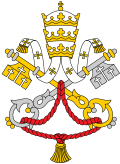Mission and activities
| Part of a series on the |
| Roman Curia of the Holy See |
|---|
 |
| |
From the Statutes of the Dicastery for Promoting Integral Human Development: [10]
The Dicastery promotes integral human development in the light of the Gospel and in the tradition of the Church's social teachings. To this end, it maintains relations with the Conferences of Bishops, offering them its cooperation so that values related to justice and peace as well as the care of creation may be promoted.
[...]
In fulfilling its mission, it may establish relationships with associations, institutes and non-governmental organizations, including those outside the Catholic Church, who are committed to promoting justice and peace. It may also enter into discussion with representatives of civil governments and other international public institutions, in order to promote study, deepen knowledge, and public awareness regarding matters within its competence, while respecting the competencies of other offices of the Roman Curia.
The Dicastery for Promoting Integral Human Development is committed to fostering among peoples: sensitivity for peace, commitment to justice and solidarity with those who are most vulnerable such as migrants and refugees, particularly through the celebrations of the World Day of Peace, the World Day of Migrants, the World Day of the Sick. Its activities include also the presentation of the annual Lenten Message of the Pope.